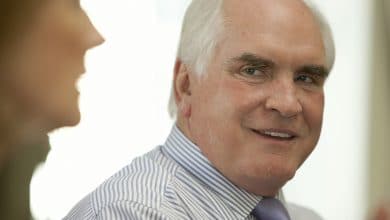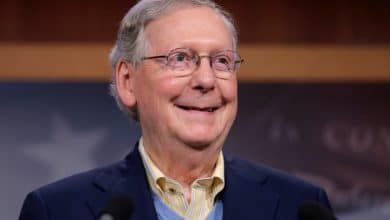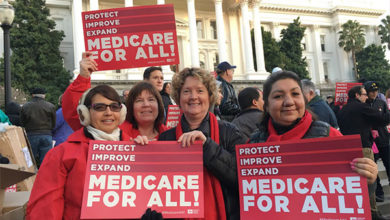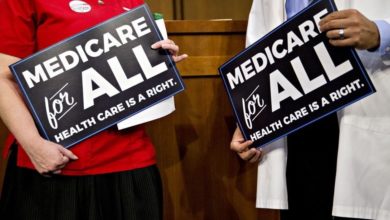HealthcareMedicare
The Time for Medicare for All is Here

In 1965, when Medicare for seniors was enacted, its champions saw it as a first step toward Medicare for All. When Medicare was expanded in 1972 to cover people with disabilities, a second big step toward that goal was taken. Many thought Medicare for children – Medikids or Kiddicare, as it was sometimes called – was just around the corner.
But progress toward Medicare for All was sidetracked when President Ronald Reagan proclaimed that government is not the solution, but the problem. Buying into that framing, Democratic Presidents Bill Clinton and Barack Obama sought not to expand Medicare, but focused instead on pursuing private sector market-based solutions to the goal of universal guaranteed health insurance.
This was unfortunate, notwithstanding the good that was achieved by the enactment of the Affordable Care Act. Despite the fact that Medicare covers only seniors and people with disabilities – people who, on average, have the highest medical usage and cost – it is extremely efficient, with lower administrative costs than private sector health insurance.
This is because insurance is most efficient when it has as wide a risk pool as possible. The only entity that can require universal, mandatory participation is the federal government. Instead of high-paid CEOs, Medicare is administered by government employees whose salaries are modest. Unlike private health insurance, the people in charge of Medicare are not seeking profits for shareholders; no one is expending funds for advertisements to gain market share. Moreover, Medicare is much more popular than private health insurance.
Though the Democratic Party lost its way and forgot its goal of Medicare for All, it is now returning to its roots. The immensely popular, overachieving presidential campaign of Senator Bernie Sanders has forcefully challenged the Reagan assertion. By proposing expansion of Social Security, tuition-free public college, and Medicare for All, he is demonstrating that government is the solution to the quest for economic security.
Following up on his presidential campaign, Senator Sanders introduced the Medicare for All Act of 2017, along with some of the most prominent Senators being mentioned as possible Democratic presidential candidates in 2020. The Medicare for All legislation in the House has 122 cosponsors (nearly two-thirds of all House Democrats) and they have just established a Medicare for All caucus to educate Americans about the bill and push for its enactment.
Moreover, recent polls show that the American people overwhelmingly want to see Medicare expanded, not cut. If the Democrats run on this profoundly wise policy, which is also an exceedingly popular and politically winning issue, they will see victory in November.
If they are victorious, they must show the American people that they are serious. If Democrats gain control of at least one chamber of Congress, they should immediately hold hearings that highlight the inefficiency, immorality, and ineffectiveness of our current patchwork of health insurance. This porous patchwork rewards those seeking a profit and leaves behind 41 million Americans who are underinsured and another 27.6 million Americans who have no health insurance whatsoever.
Those hearings in the next Congress should include as witnesses people who have suffered under the system, including those who have lost loved ones because those loved ones did not have adequate insurance protections and so did not get the treatment that they needed. Democrats should include as witnesses people who have had experience under other systems, like the two sisters who each were diagnosed with breast cancer but had very different experiences because one lived in the United States, the other in Canada.
The hearings should be structured to educate policymakers, the media, and the American people about both the policy and human cost of our current system and what we could achieve if Medicare were improved and expanded to cover everyone.
Once the hearings are completed, there should be full and open executive sessions in committee and extensive discussion and debate on the Floor. Members can debate and decide whether to continue on the incremental path. They could, for example, vote for legislation that improves Medicare by covering dental, hearing, and vision care. They could lower the initial age of eligibility to 50 and end private insurance’s age tax. Alternatively, Democrats could vote for comprehensive Medicare for All, phased in to ensure its success.
Whichever approach the Democratic members of Congress choose to take, the American people should see that the Democrats can and will pass legislation to improve the economic security of all of us by expanding Medicare. If this is done, the Republicans will finally have to accept accountability for their efforts to undermine Americans’ health care.
If champions of Medicare for All schedule votes on the issue, once Democrats have the power to control the legislative calendar, Republican politicians will have nowhere to hide. They will have to stand up and be counted. They can obstruct, propose an alternative, or they can go along. But they will have to take a position. And they will not be able to easily demagogue the issue and scare their constituents, because the American people already know what Medicare is.
If the Democrats run on Medicare for All and follow through once in office, they can carry this issue into the 2020 campaign. That is where it should be. Our health is too important to have questions about our medical care decided behind closed doors.
If there is full and open debate, I am confident we will make progress. Our elected leaders will finally recognize what the overwhelming majority knows: Health care is a right, not a privilege. When we are sick, our focus should be on getting better, not on how we are going to pay our bills. And our nation should join the rest of the industrialized world, where health care is universal, the cost savings allow for spending on other pressing priorities, and health outcomes are the best that medicine can provide.







